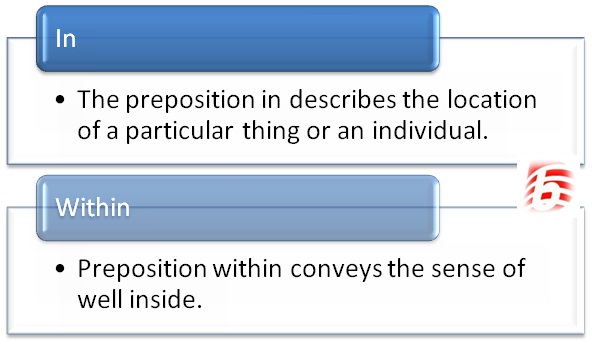Difference Between In and Within in English Grammar
In vs Within in English Grammar
Though in and within may sound similar, there is a difference between in and within in English grammar due to their usage. Before analyzing the difference between in and within, let us first have a look at the two words linguistically. One of the first facts that should be mentioned is that though in and within are primarily used as prepositions there are other uses for these two words. In is also used as an adjective and adverb. Within is also used as an adverb apart from using it as a preposition. The preposition ‘in’ is used to describe the noun in the locative case. On the other hand, the word within gives the sense of well inside.
What does In mean?
According to the Oxford English dictionary, in is “Expressing the situation of something that is or appears to be enclosed or surrounded by something else.” We can say that in describes the location of a particular thing or an individual. Look at the following sentence.
He lives in New York City.
In the above sentence, the preposition in describes the location of a person.
What does Within mean?
The second preposition, within, gives the sense “inside (something)” according to the Oxford English dictionary. Look at the following example.
He works well within himself.
In this sentence, the word within conveys the sense of well inside and gives the idea ‘he works well inside his self’. Here, the word within gives the extra meaning of good.

What is the difference between In and Within in English Grammar?
As mentioned earlier, the preposition in describes the location of a particular thing or an individual while the preposition within conveys the sense of well inside. More to this, the two words in and within give different meanings when used differently with other words. For example, in the expressions ‘in time’ and ‘within the given time’, the two words in and within are used in different senses.
Look at the two examples given below.
He came in time.
He came within two hours.
In the first sentence, the preposition in gives the sense of advance and gives the idea of ‘he came in advance’. In the second sentence, the word within gives the sense of under and gives the idea of ‘he came under two hours.’
Thus, it is interesting to note that the word within is used in the sense of under whereas the preposition in is used in the sense of advance.
Look at another usage,
‘He came in two hours’.
Here the preposition in is used in the sense of ‘at the completion’ or ‘at the stroke of’. Hence, it gives the idea of ‘he came at the completion of two hours’. These two words, in and within, are very much used in combination of several verbs too.
Summary:
In vs Within
• In and within are both well-known prepositions.
• The preposition in describes the location of a particular thing or an individual.
• The preposition within conveys the sense of well inside.
• Other than these main uses and meaning, in and within are used in phrases too. For example, in time, within the given time, etc.
ncG1vNJzZmivp6x7pbXFn5yrnZ6YsqOx07CcnqZemLyue8OinZ%2Bdopq7pLGMm5ytr5Wau261zWaYp5xdrLa1tMinZg%3D%3D